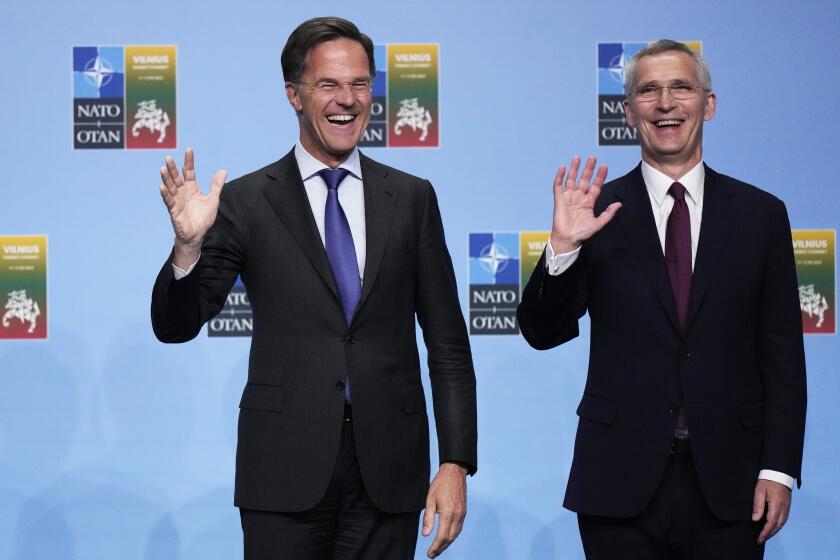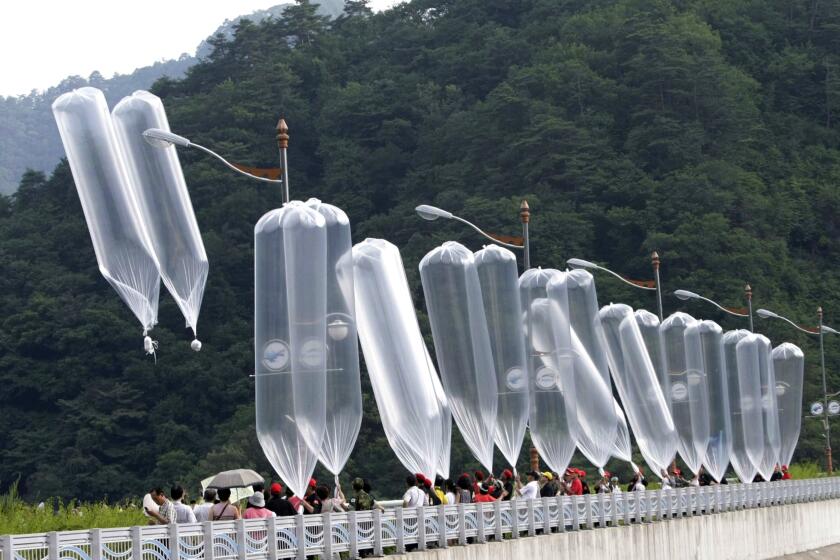Europe and NATO can’t help the U.S. counter China. Here’s why

- Share via
At a recent news conference, U.S. Secretary of State Antony J. Blinken stood shoulder to shoulder with NATO’s secretary general to deliver a sweeping vision. “The alliance recognizes that security challenges in one part of the world impact another — and vice versa,” Blinken said. He paraphrased Prime Minister Fumio Kishida of Japan: “What’s happening in Ukraine today may well be happening in East Asia tomorrow.” The subtext was unmistakable: The United States expects Europe to join its campaign to counter China’s rise, just as allies have rallied against Russia’s invasion of Ukraine.
Yet as stirring as expressions of transatlantic solidarity sound, they obscure a more complicated picture. Europe currently lacks both the military means and the political appetite to meaningfully help the U.S. balance China in Asia.
Mark Rutte knows a thing or two about finding consensus among fractious coalition partners
Major European militaries have begun conducting naval patrols in the Indo-Pacific region, but decades of underinvestment have left European armed forces too small and ill-equipped to sustain far-flung expeditionary missions. Germany, the continent’s economic powerhouse, has allowed half its tanks to fall into disrepair. Britain, once a global power, could exhaust its ammunition within two months of high-intensity combat. France’s army has shrunk from 15 divisions during the Cold War to just two today.
Sending a frigate or two on patrol is one thing; maintaining a sizable presence to deter Chinese aggression is quite another. The strategic lift, logistics and bases needed to sustain forces in the Pacific would cost staggering sums. Much of NATO Europe would be hard-pressed to defend itself against a determined Russian assault, let alone project power in Asia.
Political will is in even shorter supply. In surveys the Institute for Global Affairs recently conducted in the U.S., U.K., Germany and France — four of the North Atlantic Treaty Organization’s wealthiest countries — Europeans proved far less inclined than Americans to view China as a threat, to hold strongly negative opinions of it or to believe the West should gear up for a new Cold War. These sentiments limit how far leaders can tilt toward Washington on China, despite their soaring summit rhetoric. When they’re done championing democracy at international summits, these political leaders return to their democracies, where their policies will be informed — and constrained — by their voters’ preferences.
China lifted its one-child policy nearly a decade ago. A growing number of couples aren’t having any.
If Washington pressures European capitals to join its campaign to limit China’s power and influence, it could yet again estrange the U.S. from its most important allies. Confronting China as a merry band of democratic countries may feel emotionally satisfying, but over the long term, it is unwise. Europeans are already disillusioned by their involvement in the interminable post-Sept. 11 wars and wary of America’s tendency toward military interventions. President Biden should be careful to not drag them into a more expansive global contest to which they neither want to nor can contribute.
Disputes about trade and technology accompany these military and political differences. America’s Inflation Reduction Act and the European Union’s proposed carbon border tax, for instance, create tensions. Economic disagreements pale before the overriding imperative of deterring Chinese or Russian aggression against Taiwan or NATO territory, but considering all these factors, the U.S. and Europe should split their attention. As it concentrates forces in the Pacific, the U.S. should encourage Europe to bolster its defenses closer to home. European allies should double down on deterring Moscow rather than dilute their efforts in a far-off region where they can make little difference.
Kim Jong Un is terrified of South Korean news, music and TV shows reaching citizens of the North, so much so that he might pause some weapons programs to avert an influx of USB drives.
Over time, a more robust European defense posture might enable more contributions in the Pacific. But developing the necessary expeditionary capabilities would require drastic investment in areas such as airlift and sealift that most European militaries have long neglected. If Europe instead concentrates on securing its own neighborhood, it would relieve the U.S. of its costly burden there and free it up to focus more on the Indo-Pacific. This approach would also be politically popular, with our surveys finding large pluralities of Europeans who want to increase their country’s defense spending; about 9 out of 10 Europeans want Europe to be primarily — or wholly — responsible for its own defense.
For all the heady invocations of free-world solidarity, the reality is that Europe cannot be America’s wingman in Asia — at least not anytime soon. The world’s leading democracies may share many of the same values, but their interests and abilities diverge with geography. Effectively managing authoritarian challengers such as China will require a division of labor among allies, not the pretense of lockstep coordination. As NATO member countries gather in Washington this week, let’s hope for less chirpy idealism for a world that might be and more alert realism for the world that is.
Mark Hannah, a senior fellow at the Institute for Global Affairs, is lead author of its “New Atlanticism” report and host of its “None of the Above” podcast. @ProfessorHannah
More to Read
A cure for the common opinion
Get thought-provoking perspectives with our weekly newsletter.
You may occasionally receive promotional content from the Los Angeles Times.









